John Cho Star Trek Interview
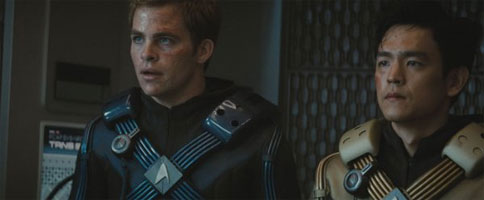
CHO BEAMED UP TO NEW TREK CHALLENGES.
EXCLUSIVE John Cho, Star Trek Interview by Paul Fischer.At first glance, the casting of Korean-born John Cho as the iconic Sulu in J.J. Abrams' Star Trek reboot may not be an obvious choice, until one sees what he does with the once chair-driven character. While John Cho is best known for his comedic work, audiences will see a new side of him as the much-anticipated Star Trek adventure blasts off in theatres. It was a philosophical, surprisingly serious Mr Cho who spoke to Paul Fischer during the recent Star Trek press junket.
QUESTION: The obvious question to start off with is, who's more jealous? You, that you don't get to work with Obama, or Kal Penn, who's not in a Trek movie?
JOHN CHO: Me. No, he's doing the real work and I'm really happy to see that come to fruition for him. I remember when he first talked to me about Obama. It was so early on, and I was like, "What?" "Who? Who-bama?" And I was like, "This guy doesn't have any experience. He's not cut for the job." I was really into Kucinich at the time, but boy, he picked the right horse. He was right. I actually called Kal after the conventions, and asked if I could campaign.
QUESTION: Really?
JOHN CHO: Yeah.
QUESTION: And you did?
JOHN CHO: Yeah. I did a lot of radio, just calling into a bunch of radio stations in battleground states, and then ended up going to Virginia, which was close, the weekend before the election as well as going to college campuses. So, it was really one of the great experiences of my life.
QUESTION: I take it you two are still fairly good friends.
JOHN CHO: Yeah. Yeah, yeah. Yeah.
QUESTION: But I guess it comes to an end with the Harold & Kumar franchise?
JOHN CHO: I'm not sure what's going on. Obviously there's scheduling issues, but I haven't talked to him, and I don't know what the terms of his job are, what the timeline is. I don't think anyone's had a real discussion about it, so I'm not sure whether it's dead, or postponed, or if it's really off the table. I don't know.
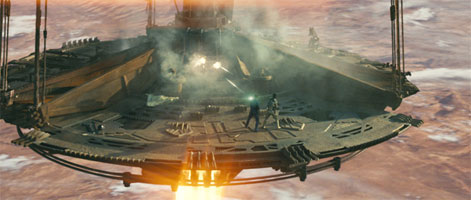 QUESTION: Apart from the Asian heritage that you and Takei share, having seen you doing your comedy, in this comedy work, you might not be the obvious choice for this role in Star Trek. So I'm wondering what you thought JJ ultimately saw in you that convinced him to cast you?
QUESTION: Apart from the Asian heritage that you and Takei share, having seen you doing your comedy, in this comedy work, you might not be the obvious choice for this role in Star Trek. So I'm wondering what you thought JJ ultimately saw in you that convinced him to cast you?JOHN CHO: You know, this is spitballing here, because we haven't had a discussion about it. I assumed there was some deliberation, because it took a couple of months for me to hear back after my one audition, but what you point out, that I'm not the obvious choice - the fact that I'm not the obvious choice might have been attractive for him, that he enjoys kind of engineering a little bit of a paradigm shift. I know that he got a real kick out of the fact that Karl Urban, for instance, who's know for being kind of a badass and a New Zealander and he was the assassin from The Bourne Supremacy. So to put him in a comedic role was a kick for him. I wonder if that was the same for me. Plus, I also wonder if the comedy chops were attractive. He's talked about the need for wit when handling this franchise, because it's been the butt of jokes a little bit, so I think as a collective group, I'm not sure how much of it shows on screen. But I think he needed actors with a sense of humor to come on board.
QUESTION: It seems that Sulu is not nearly as iconic a character, as others. Is that an advantage, then, to you, to be able to make this character a lot more your own? Does it free you, as an actor, with a character like this?
JOHN CHO: I don't know that it does, because George has stayed in the public eye more than some of the other cast members. He's also just got a distinctive presence, and voice, so I actually felt a little bit of the heat. I was wondering how much - he's just so well-known as a person now, that it was just a little dangerous for me to go into the parroting territory.
QUESTION: Was it refreshing for you to read that Sulu was going to be out of his chair?
JOHN CHO: Yeah. I mean, that'd probably be my one issue with the original series, just as the Asian viewer, wanted to see him get out of the chair more often. And so it was great for me to see him in a physically demanding role, and I really perked up when I read that.
QUESTION: And in fact, it's one of your most pivotal moments in the movie. How much preparation did you undertake for that?
JOHN CHO: A good deal. I wonder if it was to do with me never having done that. [LAUGHTER] So I started from scratch, really, and came in a couple of months beforehand and just started training every day. And there was a lot to learn, so that was just - you know, you always enjoy picking up a new skill, or learning something new on a movie. And that was it for me. Plus the fight kept changing, so I had to pick up one skill after another. First it was two sticks, and then it just kept changing, so it was cool to kind of start becoming kind of a jack of all trades, when it comes to combat.
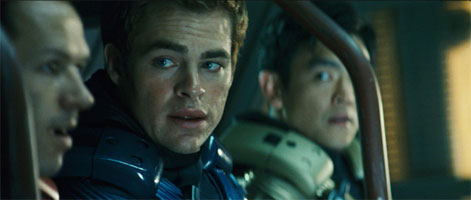 QUESTION: How strictly choreographed are these? fights Is it very strict, or is there any wiggle room at all?
QUESTION: How strictly choreographed are these? fights Is it very strict, or is there any wiggle room at all?JOHN CHO: You do it as much as you can. You choreograph it as tight as you can. And then on the day, it's like - then you get the cameras up. And then it's what's best for camera. And, you know, you may have an idea of something that may play, little moments here and there. But the bulk of it is pretty mapped out, and you and your stunt man have to both learn that routine. So, it's mapped out.
QUESTION: What are the dangers, or the challenges, I suppose, of being in a movie - and forget that it's a Star Trek film. But I think this must be one of your first experiences dealing with a tent pole summer movie. It's a pretty daunting responsibility, I would think, for an actor. I
JOHN CHO: Well, you know, it's funny. I just didn't feel any of that at all. I felt it was really JJ's responsibility and he deals with it so gracefully, I don't think any of us ever felt that pressure. I don't know how he managed to do it - he kept it very light on set. And part of it was probably starting out the process by not gathering us around for a discussion of, "Okay, how do we deal with the legacy of the series?" There weren't these serious talks, laboring over the past, and our project. It was just, jump right in and have a good time. As simple and as silly as it sounds, I think it was really effective, in terms of bringing us together as a cast. It shows. And - you know, giving us freedom to not feel that burden, and go forward, and - you know. Create.
QUESTION: The Star Trek series was both ahead of its time, and of its time. And I'm just wondering what you think the relevance of Star Trek is for this generation, and for this time?
JOHN CHO: Well, I've been thinking about that myself a little bit, because we've been having an unusually warm receptions to the film. It's been so warmly received that I've been thinking about - what is it now? And my best guess is that, again, the movie has this sense of optimism that we need right now. You know, it just seems like the whole world is feeling - has a little case of the blues. And the movie is just so hopeful in its attitude of cooperation, you know. the story is about people who find it within themselves to rise to a massive occasion. So maybe that's what we need to see and hear right now.
QUESTION: How important is it for you, for casting people to look at you as an actor, not as an Asian-American actor?
JOHN CHO: Well, that's always been my goal. Ever since - you know, since I started, and I had zero clout. I was always trying to take roles that you wouldn't necessarily expect from an Asian face. And if it was something you'd expect from an Asian person - then I didn't want to have anything to do with it. And sometimes that involved - in the early stages, it was just telling my agents, "I'd prefer not to go on this audition." And as it progressed - you know, now it's more about having a discussion about scripts, and thinking about what this says, in a larger social context, about Asian-Americans. But, you know, having said that, now I'm - it's becoming a trick that I'm learning, to not let it overwhelm you, because then you're not an artist. You're a politician. And so I'm learning now to take it easier, a little bit, and respond more with my heart, and try to decipher whether I'm excited by something or not, and go from there.
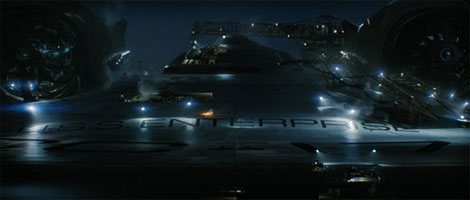 QUESTION: Is it hard to find things that excite you?
QUESTION: Is it hard to find things that excite you?JOHN CHO: Yes, a little bit. I guess it has become a little bit harder, but not by much. It just - it takes a little bit more. And your standards for writing get a little bit more stringent, and you want to be dazzled sooner in the script. You have less patience. You don't go 'til page 50. You go to page ten, and you're like - if - you should have gotten me by now.
QUESTION: You signed up for two more of these Star Trek movies, as I understand. The standard contract for franchises. In your own mind, what would you ideally like to see happen to Sulu? And where would you like to see the character go?
JOHN CHO: Well, I don't know. That's a hard question to answer. I guess I can answer vaguely. I would love it if Sulu had - I mean, he had a crisis here that was very external. Fighting with people, and whatnot. I guess to switch it around - which was great. I loved having him do that. Because again, like I say, it got him out of the chair, and beamed him down. But I guess I'd like to see maybe - as a change-up - more of an internal battle.
QUESTION: What are you planning to do next, do you know?
JOHN CHO: Well, I just completed a pilot for ABC called Flash Forward.
QUESTION: Which is?
JOHN CHO: Well, it's a good script, written by David Goyer, who did Batman Begins, so when I read it, that was a passion moment for me. I just got really excited, even though TV wasn't really on my mind. But - everyone in the world blacks out for two minutes at the beginning of the show, and there's an event that causes everyone to black out, and see a vision of their future for two minutes, everyone on the planet. And Joseph Fiennes and I play FBI agents who are trying to piece the whole mess together.
QUESTION: That sounds fascinating.
JOHN CHO: It's fascinating from so many angles, particularly from a domestic point of view, for these characters. That's what probably excited me the most. It was just - he's got a real knack for getting into a big idea, via small holes.
QUESTION: Now, has ABC indicated that it's a possibility that the show will be picked up? When will we know?
JOHN CHO: I guess we won't know 'til the up-fronts, which are in mid-May, I think.
QUESTION: So, this is going to be for the fall schedule.
JOHN CHO: Hopefully, yeah. But I hear there's a promo airing for our show on the 100th episode of Lost.
QUESTION: Do you want to go back to your comedic roots? I mean, obviously that's where a lot of your good fortune started. Are you interested in re-exploring that?
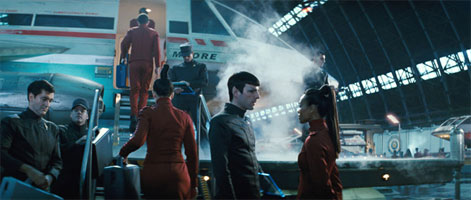 JOHN CHO: I love doing comedies. It's funny, but sometimes you find yourself laughing more in a serious drama. I guess Star Trek had its funny moments on screen, but I guess it's largely a serious movie. And my memory of it is laughing all the time. And my memory of doing, like, the Harold and Kumar movies, is almost a studious one, where we would do a take and go back to the monitor and talk about tiny tweaks. It was just really a rather serious time, oddly enough. And I kind of enjoy that about comedy, since it's more akin to math sometimes, than anything else. Like, working out a word problem. If a train is traveling 60 miles an hour west, it's like that, for me.
JOHN CHO: I love doing comedies. It's funny, but sometimes you find yourself laughing more in a serious drama. I guess Star Trek had its funny moments on screen, but I guess it's largely a serious movie. And my memory of it is laughing all the time. And my memory of doing, like, the Harold and Kumar movies, is almost a studious one, where we would do a take and go back to the monitor and talk about tiny tweaks. It was just really a rather serious time, oddly enough. And I kind of enjoy that about comedy, since it's more akin to math sometimes, than anything else. Like, working out a word problem. If a train is traveling 60 miles an hour west, it's like that, for me.QUESTION: Now, I remember going to a Margaret Cho concert. And she always makes fun of the fact that when she was growing up, the only Asians she saw on television were on M*A*S*H. What was your experience like, about looking at your own ethnicity as the way it was explored culturally in film and television?
JOHN CHO: I don't know that I have a kind of singular moment like that. I remember being generally depressed by what was on television, particularly because I was watching so much TV when - we had - you know, three channels in Korea. And when we came here, it was - the bounty was unbelievable. And it was on all day. Whereas in Korea, it was on only in the evenings. It was just - for a kid, it was unbelievable. But you were like, "Wow. Okay. We're not thought well of." And then it was coupled with - you know, really, George really was a really shining exception. And - I'm sorry, what was the question? Now I've talked myself out of it.
QUESTION: What was it like for you, discovering or not discovering your own ethnicity on film and television?
JOHN CHO: Oh, yeah. One of the things I would think about is, I wonder if that's why I never thought of becoming an actor?
QUESTION: Really?
JOHN CHO: I didn't -- it didn't occur to me 'til college. And it just really was - happened by chance. But I wonder if it was all that information that was there, convinced me, "This is not for you." And I just never had that dream. I never really thought about it.
QUESTION: So, what changed your mind?
JOHN CHO: It was a little bit like the scene in Star Trek, where somebody got sick. When I was in college, a guy said to me - I was in a writing group with a guy. And he said, "What's your height and weight?" And I told him, six-five, 280. No. [LAUGHTER] No, I told him what it was. And he said, "Somebody in my cast is sick. And I think you might fit the costume. And it's just - just a two-line part. Would you want to do it?" And I said, "Sure."
QUESTION: Why were you sucked into it, then?
JOHN CHO: I liked going to rehearsals. It was on our campus, where the rehearsal room was, it was underground, and it was a completely blacked-out room. And it just felt like home. And it was a bunch of crazy people. [LAUGHTER] That's who actors are, a bunch of crazy people. And then we got together, and we worked out these things. And I still loved rehearsals more than performing. It's that time when you're trying new things. And II think of that room often, going - that dark room, where we try things.
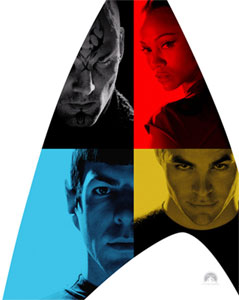
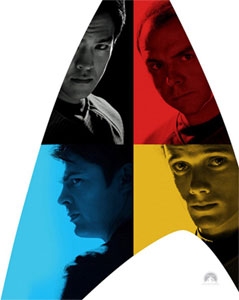
Star Trek
Starring: Chris Pine, Zachary Quinto, Karl Urban, Simon Pegg, Eric Bana, Anton Yelchin, Zoe Saldana, John Cho, Leonard Nimoy, Bruce Greenwood, Ben Cross, Winona RyderDirector: J.J. Abrams
Genre: Science-Fiction/Fantasy
Rated: M
The greatest adventure of all time begins with Star Trek, the incredible story of a young crews maiden voyage onboard the most advanced starship ever created: the U.S.S. Enterprise. On a journey... The greatest adventure of all time begins with Star Trek, the incredible story of a young crews maiden voyage onboard the most advanced starship ever created: the U.S.S. Enterprise. On a journey filled with action, comedy and cosmic peril, the new recruits must find a way to stop an evil being whose mission of vengeance threatens all of mankind.
The fate of the galaxy rests in the hands of bitter rivals. One, James T. Kirk (Chris Pine), is a delinquent, thrill-seeking Iowa farm boy. The other, Spock (Zachary Quinto), was raised in a logic-based society that rejects all emotion. As fiery instinct clashes with calm reason, their unlikely but powerful partnership is the only thing capable of leading their crew through unimaginable danger, boldly going where no one has gone before!
MORE
- Viggo Mortensen The Road
- 24 Cast Reunion
- Aaron Eckhardt No Reservations
- Aaron Eckhart The Dark Knight
- Adam McKay Step Brothers Interview
- Alan Alda Diminished Capacity Interview
- Alan Alda Diminished Capacity Interview
- Alex Dimitriades
- Al Pacino Oceans 13
- Alan Rickman Snow Cake
- Alan Rickman Sweeney Todd



